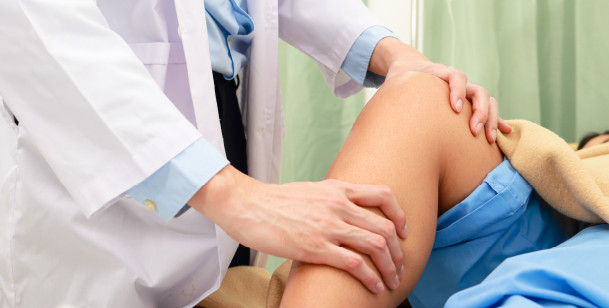Anyone who suffers from knee pain knows how much it can impact your day-to-day life. The term “burning knee pain” specifically refers to the sensation of heat or burning discomfort in your knees. This pain can be debilitating, affecting individuals of all ages and lifestyles. In this article, we’ll explore the most common causes of burning knee pain, common symptoms, how to treat burning knee pain, and preventative measures you can take to keep your knees healthy and pain-free!
Causes & Symptoms of Burning Knee Pain
Burning knee pain can affect one of both knees and can be caused by multiple conditions and injuries, including but not limited to the following:
Knee Osteoarthritis
This is a degenerative joint disease characterized by the breakdown of cartilage in the knee joint. As the cartilage wears away, the bones can rub against each other, leading to inflammation and pain in the knee, which might manifest as a burning sensation.
Knee Bursitis
“Bursae” are small sacs filled with fluid that act as cushions between bones and soft tissues around the joints to reduce friction. Inflammation of the bursae in the knee can cause burning pain and tenderness.
Tendinitis
A common condition that causes knee pain, Tendinitis is characterized by Inflammation of the tendons around the knee joint and can lead to burning pain, especially during movement.

Knee Injury
Various injuries, such as meniscus tears, ligament sprains or tears, or patellar tendon injuries, can cause burning knee pain.
Gout
Gout is a form of arthritis that results from the high levels of uric acid in the bloodstream, producing crystals in the joints. When it affects the knee joint, it can cause intense burning pain and swelling.
Rheumatoid Arthritis
This autoimmune disease can cause inflammation in multiple joints, including the knee, leading to burning pain.
Nerve Compression
Conditions like a pinched nerve or sciatica can also cause burning sensations around the knee.
Peripheral Neuropathy
Some neurological conditions can cause nerve damage and lead to sensations of burning, tingling, or numbness in the knee area.
Overuse or Strain
Excessive or repetitive use of the knee joint, such as in certain sports or activities, can result in burning pain due to wear and tear of the knee structures. A runner’s knee is an example of an overuse injury.
Other possible causes include conditions like Patellofemoral Pain Syndrome and Iliotibial Band Syndrome (ITBS).

Diagnosis & Treatment
To diagnose burning knee pain, the doctor will ask you questions about your medical history, including any previous injuries, medical conditions, and family history of joint problems. They will inquire about when the pain started, its intensity, and whether you’re experiencing pain in the front of the knee or on the sides of the knee. They will then inquire about any factors that make the pain better or worse to further investigate the origin of your pain.
The doctor will conduct a thorough physical examination of your knee. They will assess the joint’s range of motion, look for signs of swelling, redness, or inflammation, and palpate the knee to identify specific areas of tenderness or discomfort.
The doctor may perform specific tests to help identify the underlying cause of the burning knee pain. These tests can include checking for stability, ligament function, and range of motion or be more involved, like imaging studies or blood tests.
If the doctor suspects nerve-related issues, they may perform neurological tests to assess nerve function and look for signs of nerve compression or damage. In some cases, if there is significant swelling, the doctor may perform an aspiration to draw fluid from the knee joint. The fluid can then be analyzed for signs of infection or inflammation.

By carefully considering the medical history, conducting a thorough physical examination, and utilizing diagnostic tests, the doctor can accurately diagnose the cause of your burning knee pain. Once the underlying cause is identified, appropriate treatment options can be recommended to address the issue and provide relief.
Potential solutions to burning knee pain will depend on the cause of said pain but may include:
- Resting and avoiding aggravating activities.
- Applying ice or cold therapy to reduce swelling.
- Compression with a knee brace or bandage.
- Elevating the leg to reduce swelling and improve blood flow.
- Taking over-the-counter NSAIDs for pain and inflammation.
- Engaging in physical therapy to strengthen muscles and improve flexibility.
- Corticosteroid injections to reduce inflammation.
- Hyaluronic acid injections for knee osteoarthritis.
- Platelet-rich plasma (PRP) therapy or regenerative treatments.
- Managing weight to alleviate strain on the knee joints.
- Heat therapy for chronic knee pain or stiffness.
- Transcutaneous electrical nerve stimulation (TENS) for pain relief.
Some knee injuries may settle within a few weeks on their own, but in some instances, your doctor may suggest surgery as a viable option when considering how to treat burning knee pain. They will go over the procedure and treatment options they feel are right for you so that you can make an informed decision about your health.
Preventing Burning Knee Pain
The best way to address a burning sensation in the knee is to avoid it from developing if possible. Preventing burning knee pain means taking proactive measures to maintain knee health and avoiding activities or habits that could exacerbate current knee discomfort. Here are some tips to help prevent burning knee pain:
- Maintain a Healthy Weight
- Strengthen Leg Muscles
- Warm-Up Before Exercising:
- Use Proper Footwear
- Choose Low-Impact Activities
- Maintain Proper Posture
- Avoid Prolonged Kneeling
- Practice Proper Form During Exercise
- Take Breaks During Repetitive Tasks
- Stretch Regularly
- Use Knee Supports or Braces
Get Treated at Village Emergency Centers
If you feel you can complain of burning knee pain that’s hindering your daily activities and affecting your quality of life, don’t suffer in silence. Visit your Village for the care you deserve today. Our dedicated team of experienced healthcare professionals is here to provide you with the compassionate care and expertise you need to address your knee pain effectively. Don’t wait—come see us and take the first step towards a pain-free future. Visit our website to learn more.
